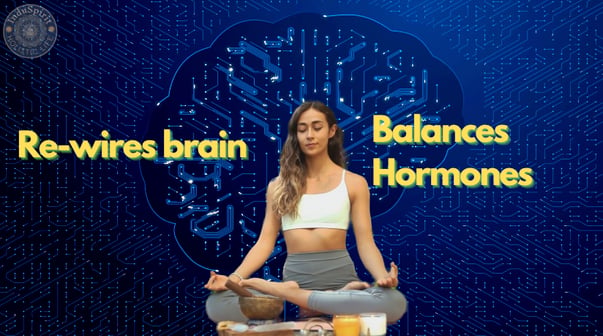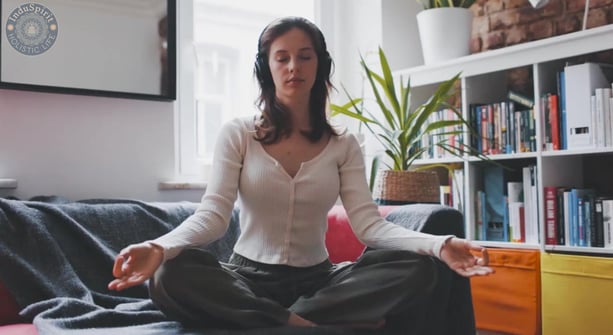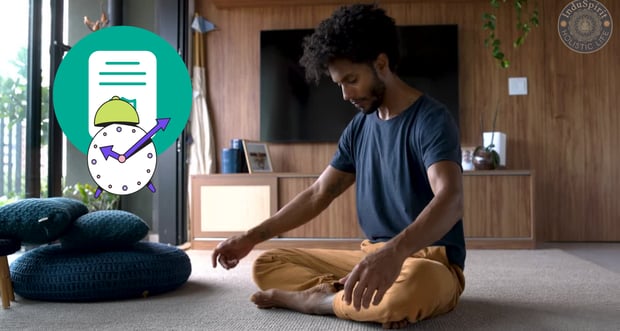
Is Meditation Worth the Hype? Discover Its Benefits Today
Curious about meditation? Learn if it’s worth your time, its science-backed benefits, and how to start quickly. Find out today!
HOLISTIC LIVING
Arjun Rishi
4 min read

Watch it on YouTube/InduSpirit
Meditation—it’s a buzzword we hear everywhere. From yoga studios to corporate wellness programs, meditation is touted as a life-changing practice that promises to reduce stress, improve focus, and even boost happiness. But is meditation worth the hype, or is it another trendy wellness fad?
Whether you're a teen looking for mental clarity, a stressed professional seeking relief, or just someone curious about mindfulness practices, this guide will explore meditation's science, benefits, and myths. By the end, you’ll know if meditation is the game changer it’s claimed to be—or if it’s overhyped.
What Exactly is Meditation?
At its core, meditation is a mental practice that involves focused attention and awareness. While there are many forms—such as mindfulness meditation, transcendental meditation, and guided imagery—they all share a common goal: fostering a state of mental clarity and relaxation.
Meditation has been rooted in ancient traditions like Buddhism for centuries, but today, it’s widely embraced in secular and scientific contexts. People meditate to quiet a racing mind, build emotional resilience, or strengthen their cognitive abilities.
Why Meditate? Exploring the Benefits
Meditation's popularity isn’t baseless. Scientific research has uncovered compelling evidence that meditation can profoundly affect the mind and body.
1. Stress Reduction Through Lower Cortisol Levels
One of the most well-documented benefits of meditation is its ability to reduce stress. A study from the Shamatha Project at UC Davis found that mindfulness meditation significantly reduces cortisol levels, the body’s primary stress hormone. Lower cortisol levels lead to better physical and mental health, making meditation an effective tool for stress relief.
2. Emotional Regulation and Mental Clarity
Harvard researchers discovered mindfulness meditation decreases activity in the amygdala, the brain's stress and emotion-processing center. This reduced activity persists outside meditation, equipping you to handle life’s challenges more calmly.
3. Better Memory and Learning
Another Harvard study revealed that an eight-week mindfulness-based stress reduction (MBSR) program increased gray matter density in the hippocampus—the brain region associated with memory and learning. This structural change could make meditation invaluable for tasks requiring focus, learning, and problem-solving.
4. Enhanced Decision-Making
Research has also shown that meditation strengthens connectivity in the prefrontal cortex, the brain area responsible for executive functions like decision-making, attention, and impulse control. For professionals, this means better productivity and sharper focus.
Is Meditation Overhyped? Debunking Common Myths
Despite its popularity, myths surrounding meditation make it seem impractical or unattainable. Let’s separate fact from fiction.
Myth 1: Meditation Requires Hours of Silence
Many believe that meditation demands long, uninterrupted sessions. The truth? Studies show that even 10 minutes a day can yield noticeable benefits. Consistency matters more than duration.
Myth 2: Meditation is Only for the Spiritually Inclined
While meditation has roots in spiritual traditions, it doesn’t have to be a spiritual practice. You can adopt it purely as a tool for better mental health without any religious or spiritual connotations.
Myth 3: Meditation Requires Clearing Your Mind Completely
Meditation isn’t about forcing your mind to go blank. It’s about observing your thoughts without judgment. Even if your mind wanders, you’re still meditating—so long as you gently refocus your attention.
Myth 4: Meditation Produces Immediate Results
While some benefits, like relaxation, may be immediate, others—such as improved focus or emotional resilience—develop over time. Consider meditation a skill; the more you practice, the better the results.
Meditation for Beginners: How to Get Started
If you’re intrigued but unsure how to begin, here’s a simple roadmap:
Step 1: Choose a Comfortable Environment
Find a quiet space where you feel relaxed. Sit comfortably, either on a chair or the floor. You don’t need fancy cushions or incense—your couch will do just fine.
Step 2: Start Small
Begin with just 5-10 minutes a day. Use a timer or meditation app to guide you. Apps like Headspace or Insight Timer are great tools for beginners.
Step 3: Focus on Your Breath
Close your eyes and take slow, deep breaths. Pay attention to the sensation of air entering and leaving your nose. This will serve as your anchor.
Step 4: Expect Your Mind to Wander
It’s natural for your thoughts to drift. When it happens, gently bring your focus back to your breath. Over time, this process strengthens your ability to concentrate.
Step 5: Explore Different Techniques
Experiment with mindfulness, guided meditations, or body scans. Find what works best for you and aligns with your goals.
Step 6: Be Consistent
Set a daily routine that’s realistic for your lifestyle. Morning, lunch breaks, or evenings are great times to meditate.
The Time Commitment of Meditation
A common concern is that meditation takes too much time. However, you don’t need to sit in a lotus position for hours. Here’s a breakdown of what realistic meditation schedules could look like:
Beginner: 5-10 minutes daily for the first month.
Intermediate: 15-20 minutes daily once you’re comfortable with the basics.
Advanced: 30 minutes or more for those looking to deepen their practice.
Remember, it’s about quality, not quantity. A focused 10-minute session can be more effective than a distracted 30-minute one.
Is Daily Meditation Truly Life-Changing?
While meditation is not a magic bullet, its benefits can be life-changing when integrated consistently. Regular meditators report better emotional resilience, improved sleep, and heightened focus. And as science shows, its measurable impact on brain structure underlines its potential as a powerful wellness tool.
Who Can Benefit the Most?
Meditation is versatile and can be customized to suit:
Teens managing school stress
Professionals coping with work pressures
Parents seeking mental balance
Yoga enthusiasts deepening their practice
Mindfulness seekers and health enthusiasts
The Science of Meditation vs. The Hype
It’s easy to dismiss meditation as overhyped, but the growing body of scientific research supports its efficacy. From reducing stress to rewiring the brain, meditation offers tangible benefits for anyone willing to try it.
Your First Step to Mindfulness Awaits
Meditation might not solve every problem, but it can equip you with the tools to face them with greater clarity, calm, and resilience. The benefits are hard to ignore, whether you're meditating for stress relief, cognitive enhancement, or emotional balance.
Still wondering if meditation is appropriate for you? The best way to find out is to try it for yourself. Start small, stay consistent, and remember—it’s all progress, no perfection.







